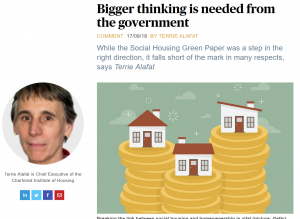 Today the Chartered Institute of Housing (CIH) Chief Executive, Terrie Alafat, told Inside Housing that she welcomed the Government’s Green Paper on Social Housing, but explained that it doesn’t go far enough.
Today the Chartered Institute of Housing (CIH) Chief Executive, Terrie Alafat, told Inside Housing that she welcomed the Government’s Green Paper on Social Housing, but explained that it doesn’t go far enough.
https://www.insidehousing.co.uk/comment/bigger-thinking-is-needed-from-the-government
The Green Paper
For leaseholders and shared ownership leaseholders, the Green Paper begins to look at a number of important issues. At section 3.5 of the document and in particular para 87 the Green Paper States:
A lack of transparency around service charges can lead to fears that leaseholders are cross-subsidising other residents. Consultation over major works can often be seen as failing to obtain meaningful input from leaseholders or to take their views on board, especially when maintenance and repairs are managed through broad framework agreements or longer term contracts. And, unlike in the private market, there is no real sanction for social landlords who do not comply with requests for information because the local authority can be both the landlord and enforcer.
A copy of the green paper can be found here and we would urge leaseholders, shared owners and social rental tenants to respond to this request for their input.
https://www.gov.uk/government/consultations/a-new-deal-for-social-housing
The online response form can be found here:
https://www.surveymonkey.co.uk/r/A_new_deal_for_social_housing
The most relevant section is section 3 and questions 21 to 51.
The survey can be part saved so don’t worry that you have to complete it in one go.
Turning back to the thoughts of the CIH Chief Executive:
Ms Alafat might look in the mirror first, when advising the government to do more, and ask herself why she didn’t do so when she was a civil servant and in charge?
Alafat lists herself as Director of Housing at DCLG from 2002 to 2015, when she left the civil service. The announcement of her appointment as Chief Executive of the Chartered Institute of Housing took place in December 2014.
During her role at DCLG, where she was responsible for housing issues, Director Alafat had overall responsibility for leasehold issues. By 2011 however her allocation of resources to leasehold matters had become so small that not a single civil service manager had the term “leasehold” in their job description. In addition no one in her department had any idea how big the sector actually was. It was also under Alafat’s reign that the Department was at its most vociferous in arguing that there were no major problems in the leasehold sector and that the legislation was well balanced between the landlord and the leaseholders’ interests.
During this period the DCLG funded Leasehold Advisory Service (LEASE) were at their worst. They happily provided help to landlords and developers to gain an advantage over leaseholders. Under her leadership the Department was also less than keen to do anything to encourage commonhold. Yet, like a number of other civil servants, Alafat was given a CBE – for doing her job.
LKP would suggest that CIH and the wider social sector has, for far too long, turned a blind eye to some of the inefficiencies in building maintenance costs. These costs are then passed on indirectly to their rental tenants and more directly to their shared ownership tenants and their right to buy leaseholder tenants.
One big source of problems, as highlighted in the Green Paper, is the use of Framework Building Maintenance Agreements in the social sector, also known as Qualifying Long Term Agreements (QLTA’s). In our submission to the Green Paper LKP will assert that there is often NO legitimate justification for the use of these agreements. The sector has spent far too many years wrongly asserting they are following the “Egan Principles”, European Procurement rules, and complying with government value for money statements as a justification for the use of QLTA’s.
LKP is aware that many in the social sector will claim that it is simply a myth that leaseholders are overcharged, and that there are protections in place to stop any form of cross subsidy. The problem is that’s not how it works in practice for many sites. More than one or two social landlords are also happy to spread dissent among their three groups of tenants by allowing each to think that the other groups may get some level of subsidy. LKP would suggest all three types of tenants are being disadvantaged, not at each other’s expense, but due to the inefficiency of their social landlord.
We are not suggesting that all social landlords do things badly, but we are suggesting that the Chartered Institute of Housing and the National Housing Federation could have done a lot more a long time ago, as indeed Ms Alafat could have done, including in her previous incarnation, when she herself was a senior official in the relevant part of government.





 Kate Osamor MP asks parliamentary questions for Long Harbour on ground rents, says Daily Telegraph
Kate Osamor MP asks parliamentary questions for Long Harbour on ground rents, says Daily Telegraph





















The latest crock of shit (oops, report) from The Law Commission on leasehold reform was made available at one minute past midnight this very day. Eight hours and eleven minutes later and nothing from LKP, simply not good enough LKP – you guys don’t sleep, do you?
A summary of what this means for owners of leasehold houses:
“Options to reduce premiums payable by leaseholders of houses including:
• a simple formula (ground rent multiplier, or percentage of capital value)”.
Thanks for that Nick old boy, things are a lot clearer now.
URGENT…. PLEASE, please complete the LAW COMMISSIONS SURVEY ON LEASE ENFRANCHISEMENT before the 20th November 18.
Thank you.
URGENT…. URGENT….URGENT…
PLEASE, please complete the LAW COMMISSIONS SURVEY ON LEASE ENFRANCHISEMENT before the 20th November 18.
Thank you.
Yes, lets all agree on the following terms and keep it very simple ::
For statutory 90 years lease extension , the cost shall be 10 x annual ground rent in 1st year of lease.
For enfranchisement of block of flats, the cost per flat shall be 10 x annual ground rent in 1st year of lease.
For enfranchisement of leasehold house, the cost of freehold shall be 10 x annual ground rent in 1st year of lease .
The reason why I say annual ground rent in 1st year of lease is because so many freeholds were sold off by developers without prior offer of RFR to leaseholders.
If any freehold companies suffer financial loss , they can claim against the original developer which sold off the freehold title.
This proposal is so simplistic; the danger is that the Law Commission will probably not give it any serious thought and an opportunity will have been lost.
The Law Commission have made it patently clear in the supporting documentation issued that they need to have regard to the human rights of the freeholder. The publication by the law commission gave three summarises: one for leaseholders of houses, one for leaseholders of flats and a third for freeholders. It then published a fourth summary of the human rights issues it needs to consider.
Therefore any formula will need to consider the loss of ground rent , its review pattern and of course the value of the reversion. Marriage value may be more debateable
Stephen, the freeholder has had a stream of ground rents from the building since it’s creation, in many cases doing nothing for this income. They probably also got a healthy profit when the flats were sold in the first place. So in that situation, how has the freeholder suffered in human rights terms, other than losing the ability to keep going back to the well by charging for lease extensions, or increasing ground rents ? If an investor owns the freehold and purchased it from say Persimmon expecting a tidy income, then as you know with any investment, values can fall as well as rise depending on circumstances. I would make a lease extension also an option to buy a share of the freehold, if that is what the leaseholder desires. Eventually the freeholder would lose their majority interest, leaseholders would be commonholders and be able to exercise other rights like Right to Manage more easily. Over time in this way Leasehold would die off in England and Wales.
I read part way through the Law Commission latest report, 500+ pages. There is a danger that the rotting, complex edifice that is leasehold now is replaced with something that is also too complicated, and continues to be a feast for solicitors and surveyors. 10 to max 20 times annual ground, or 1% of the property value for 100 year lease extension, or share of the freehold. Take all the nonsense like marriage value out of it !
The lease is very clear that the ground rent is for nothing. It is viewed as a burden on the property and results in the freeholder getting less for the property, He would get more on the sale of the lease if it was a peppercorn and 999 years. Therefore the imposition of a ground rent and offering a less than 999 years is a form of deferred consideration. Therefore if it is to be removed it should be valued properly
We have had 25 years of legal arguments over capitalisation rates, deferment rates and marriage value. It should now be possible to draw the threads together from the thousands of published case. For flats and houses which fall within certain perimeters (i.e. the vast majority) a formula should be capable of being devised with the capitalisation rate, deferment rate and relativity being prescribed with a calculator being available on line to calculate the figure
No, ground rent is often used just to show it is a leasehold as opposed to freehold property, a legacy issue from the Middle Ages. I disagree that our freeholder would have got more selling the flats under a commonhold regime in 1997 (even though commonhold did not exist then) when the building was developed compared to the 125 year leases then offered. However the story is very different today because resale prices for the flats have plummeted, despite over 100 years left on the lease. People are more aware of leasehold and put off by it, and mortgage lenders much more cautious now with a leasehold as opposed to freehold.